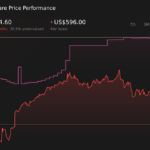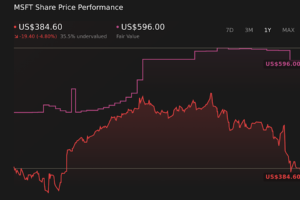
U.S. stock indexes traded lower Monday morning, with the Russian invasion of Ukraine is in its 12th day as investors weigh the implications of possible bans on Russian oil imports, which could exacerbate inflationary pressures.
What’s happening
- The Dow Jones Industrial Average DJIA, -1.05% fell 338 points, or 1%, to 33,273.
- The S&P 500 SPX, -1.01% dropped 38 points, or 0.9%, to 4,292.
- The Nasdaq Composite Index COMP, -1.03% slipped 0.6%, or 84 points, to 13,227.
Last week, the Dow industrials and the S&P 500 each fell 1.3%, and the tech-heavy Nasdaq Composite dropped 2.8%. Meanwhile, the S&P GSCI SPGSCI, -4.84% index, which tracks 24 exchange-traded futures contracts across five physical commodities sectors, saw its biggest weekly surge in more than 50 years.
What’s driving markets
Markets opened lower but weren’t producing the declines futures markets had indicated in overnight trade, when comments by U.S. Secretary of State Antony Blinken helped to push crude-oil prices sharply higher.
Blinken said the U.S. and its allies were considering a ban on Russian oil imports as the invasion of Ukraine continued. So far, sanctions aimed at Russia have excluded the energy sector, as the country provides about 45% of European Union gas imports, according to International Energy Agency data.
However, some discussion of a possible detente was helping to moderate the severity of the pullback on Monday.
Recent reports indicate that Russia is willing to halt military operations “in a moment” if Ukraine meets a list of conditions, including ceasing military action, changing its constitution to enshrine neutrality, acknowledging Crimea as Russian territory, and recognizing Donetsk and Lugansk as independent regions within Ukraine, Reuters reported, citing remarks from Kremlin spokesman Dmitry Peskov.
It isn’t clear that Kyiv would entertain those demands. Ukraine on Monday rejected an offer to open a humanitarian corridor to let civilians cross into Russia and Belarus.
Meanwhile, grain prices also were surging, with wheat W00, +7.03% futures jumping 7%, continuing a march toward all-time highs as the war shuts down exports from the Black Sea region, a crucial global breadbasket.
“The galloping commodity prices will naturally put downward pressure on the economy and increase operational volatility for many companies already struggling with inflationary pressures,” said Peter Garnry, head of equity strategy at Saxo Bank.
Strategists at Citi cut their year-end S&P 500 target to 4,700 from 5,100. “We expect that a higher geopolitical risk premium will hurt broader market expected valuations,” said strategists led by Scott Chronert. “Implicitly, we see upside to US equities from here as the market narrative moves past the current perfect storm of headwinds, but to a level implying a flattish, to slightly down full-year return.”
See: Wall Street is beginning to cut S&P 500 forecasts as oil prices surge









